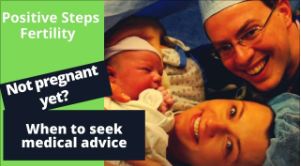Infertility is tricky. There may not be an obvious reason for why you’re struggling to conceive, and that is a frustrating feeling. When you throw egg counts into the mix, it’s easy to walk away confused and disheartened about your fertility situation.
That’s why it’s important to know the signs that might indicate a potential problem—and when to get tested. The American Society for Reproductive Medicine (ASRM) estimates that about 6 million people in the U.S. are struggling with infertility, which is why it’s important to know what symptoms may indicate problems with your egg count or other reproductive issues.
Depending on your age, it might be time to get your eggs tested.
If you’re under 35 and trying to conceive, your doctor may recommend that you get your egg count tested. This is because the ovarian reserve tends to drop as women get older, and egg count is one of several key components of fertility. Though the quality of eggs is often just as important as the quantity.
Generally, as you age, the number of quality eggs you have in reserve diminishes.
- In your 20s, 80-90% of eggs are chromosomally normal.
- In your early 30s, 67% are.
- In your mid to late 30s, roughly 30% are good quality.
- In your 40s, that number is 25% or less.
- By 45, you could have 90-95% of eggs that are chromosomally abnormal.
So depending on where you fall on this spectrum, it might be a crucial time to have fertility testing done to determine both the quantity and quality of your eggs.
If you are experiencing trouble with conception, testing could help diagnose the issue.
It’s also worth considering seeing a fertility specialist if any factors are present in your life that could impact your ability to conceive naturally: for example, if you have recently been diagnosed with diabetes.
Conditions like this can affect ovulation cycles which can lead to irregular periods—and since we only have a short time after ovulation in which an egg can be fertilized by sperm before it dies off again—this delay could cause issues down the road when trying to conceive!
If you have a family or personal history of conditions like early menopause or premature ovarian failure, your doctor may request tests.
Premature ovarian failure (POF) is a condition that causes your ovaries to stop working before age 40. It’s rare, but if left untreated it can lead to infertility and other health problems. Your egg count usually starts declining at age 35 and continues until menopause begins around age 51.
If you’re close to reaching this average number of eggs in your ovaries when you begin having regular periods, it could mean that something is interfering with their production—like certain diseases or drug use—and that the eggs aren’t as healthy as usual.
When you have irregular or painful periods.
If your periods are irregular and painful, it could be a sign of endometriosis . This is a condition where cells lining your uterus grow outside of the uterus in other parts of your body. These cells can cause intense pain and inflammation that affects ovulation, fertility, and even your overall health.
What does endometriosis have to do with egg counts? Research indicates that the condition can affect the quality of eggs.
Signs of endometriosis include painful intercourse, pain during bowel movements, or pain in the lower abdomen—all issues that can make it difficult for you to enjoy sex, which could indirectly affect fertility. Additionally, endometriosis could also directly affect fertility .
What kind of tests can you expect?
We’ve listed a few key indicators of when it might be time to get your egg count checked, but you might be wondering what kind of tests can you expect. Here are just a few common ovarian reserve tests:
AFC Testing – Antral Follicle Count
AFC testing is a simple count of mature follicles in the ovaries. It is done via transvaginal ultrasound, enabling a fertility specialist to view an enlarged image of the reproductive system and count the number of follicles by sight. An AFC count can reveal whether the number of eggs is consistent with that expected for one’s age. It can also serve as an indicator of whether IVF will produce desired results. However, though AFC and AMH are considered the gold standards, neither is perfect.
FSH – Follicle-Stimulating Hormone Test (FSH)
“The FSH test measures the level of follicle-stimulating (FSH) in your blood. FSH is made by your pituitary gland, a small gland located underneath the brain. FSH plays an important role in sexual development and functioning.”
In women, FSH tests are most often used to:
- Help find the cause of infertility.
- Find out if there is a problem with ovarian function.
- Find the reason for irregular or stopped menstrual periods.
- Confirm the start of menopause or perimenopause. Menopause is the time in a woman’s life when her menstrual periods have stopped, and she can’t become pregnant anymore. It usually starts when a woman is around 50 years old. Perimenopause is the transition period before menopause. It can last for several years. FSH testing may be done towards the end of this transition.”
A blood sample was drawn on cycle day three to measure follicle-stimulating hormone (FSH) levels. The primary role of FSH is to ensure egg growth within the follicle so that mature eggs are released during ovulation. Of note, FSH is a late marker of ovarian problems, where only 50% of women over age 45 will have elevated FSH.
AMH Anti-Müllerian Hormone Test
Ovarian follicles produce a hormone called AMH. AMH serves several roles, but perhaps the most important is sex differentiation between male and female embryos. It keeps baby boys in the womb from developing girl parts and vice-versa. Essentially, though, the higher your AMH levels, the higher your ovarian reserve because a high AMH count indicates a greater number of follicles in the ovaries.
“An AMH test is often used to check a woman’s ability to produce eggs that can be fertilized for pregnancy. A woman’s ovaries can make thousands of eggs during her childbearing years. The number declines as a woman gets older. AMH levels help show how many potential egg cells a woman has left — known as the ovarian reserve. If a woman’s ovarian reserve is high, she may have a better chance of getting pregnant. She may also be able to wait months or years before trying to get pregnant. If the ovarian reserve is low, it may mean a woman will have trouble getting pregnant, and should not delay very long before trying to have a baby.”
Why egg count tests are important.
Your ovarian reserve is not the only factor affecting fertility, but it is a key indicator for your specialist to understand your specific needs. Meeting with a fertility specialist can get you back on track for your fertility journey, and help you understand the underlying factors, both controllable and uncontrollable, that make the most impact on your ability to conceive.
If you are struggling with fertility or just have questions, reach out to a fertility specialist today. Don’t suffer in silence. Get help. Get peace.




